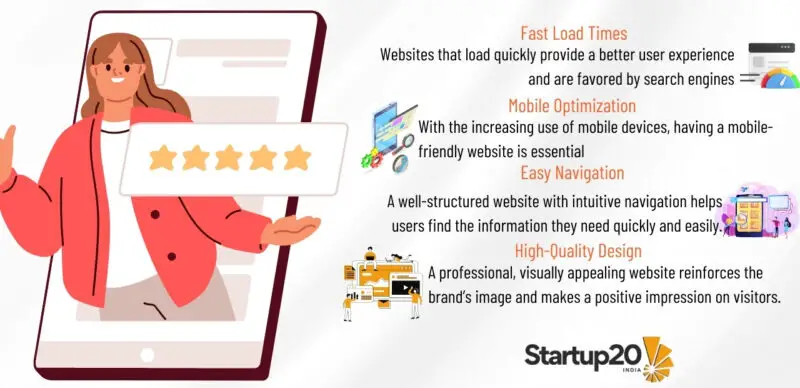With so many businesses trying to establish an online presence, search engine optimization has become a foundation.
You simply cannot establish an online presence without it, period. But with high competition, knowing exactly what you are doing is an absolute must.
That is why I want to discuss the role of SEO in building a brand.
Table of Contents
ToggleSynergy between SEO and Branding

The integration of SEO and branding efforts creates a powerful synergy that can significantly enhance a startup’s online presence.
It is a synergy that is the result of combining two critical elements of digital marketing:
- SEO, which focuses on improving a website’s visibility and attracting organic traffic
- Branding, which aims to establish a unique and memorable identity.
By utilizing both of these, startups can create a comprehensive and cohesive digital presence that amplifies the effects of both SEO and branding efforts.
SEO is fundamentally about making a website more visible on search engines.
If you know that 68% of all online experiences start with a search engine, it becomes more than clear why this is needed.
The process involves optimizing various aspects of the site, such as content, technical elements, and backlinks, to ensure it ranks higher in search engine results pages (SERPs).
Higher visibility in SERPs leads to increased organic traffic, bringing more potential customers to the website.
Why does Google play a role in this process?
It is rather simple; more than 92% of global traffic comes from two sources:
- Google Search
- Google Images

Next, branding is about creating a distinct identity that resonates with the target audience.
It encompasses:
- Visual elements of the brand
- Brand’s voice, values, and messaging
Effective branding makes a startup memorable and helps build an emotional connection with customers.
When users recognize and trust a brand, they are more likely to engage with its content and convert into loyal customers.
The Importance of SEO in Building a Brand
Now that we know about the synergy between two main components, let us talk about SEO’s role in building a brand from scratch.
Increases Visibility
SEO is essential for increasing a brand’s visibility online.
By optimizing a website for relevant keywords and improving its search engine rankings, startups can ensure that their brand appears prominently in search results.
High visibility on search engines is particularly important for startups, as it helps level the playing field with more established competitors.
Just recently, Hubspot released a report where it states the following:
- Published blogs get 55% more traffic
- 434% more pages indexed by search engines
- They get 97% more backlinks than non-blog sites
Builds Credibility and Trust

Ranking high on search engine results pages (SERPs) is often associated with credibility and trust.
When a brand consistently appears at the top of search results, users are more likely to perceive it as an authoritative and reliable source.
Through investing in SEO and achieving high search rankings, startups can build credibility with their target audience, encouraging users to:
- Click on their links
- Explore their websites
- Become loyal customers
High search rankings also signal to potential customers that the brand is relevant and reputable, further strengthening their trust and confidence in the business.
Drives Targeted Traffic
SEO helps attract users who are actively searching for specific products or services, making it a highly effective way to drive targeted traffic to a startup’s website.
Targeted traffic is more likely to convert into leads and customers, providing a valuable return on investment for SEO efforts.
Compared to organic social media, SEO drives 1000% more traffic.
Through analyzing search data and user behavior, startups can gain insights into their audience’s preferences and tailor their marketing strategies accordingly, further enhancing their ability to attract and retain customers.
SEO Branding Techniques
To drive brand visibility and awareness through SEO, startups should implement several key techniques that focus on both search engine optimization and brand building.
Here are the primary strategies to consider:
Optimizing for Relevant Keywords

Keyword optimization is the cornerstone of effective SEO.
Startups need to identify and target relevant keywords that potential customers are likely to use when searching for their products or services.
It involves thorough keyword research to find terms that have a good balance of search volume and competition.
Some tools can be invaluable in this process, like:
- Google Keyword Planner
- Ahrefs
- SEMrush
Once the relevant keywords are identified, they should be strategically integrated into the website’s content, including:
- Titles
- Meta descriptions
- Headers
- Body text
It’s crucial to use these keywords naturally and avoid keyword stuffing, which can lead to penalties from search engines.
The goal is to create content that is both search-engine friendly and valuable to the user.
Creating High-Quality, Engaging Content
Startups should focus on producing high-quality, engaging content that addresses the needs and interests of their target audience.
It can include:
- Blog posts
- Articles
- Videos
- Infographics
- Podcasts
The content should be informative, well-researched, and aligned with the brand’s voice and values.
It should also naturally include relevant keywords, ensuring that it ranks well in search engine results while remaining engaging for readers.
Interesting Fact: Posts that have images and graphics attract 650% higher engagement.
High-quality content not only helps attract and retain visitors but also establishes the brand as an authority in its field.
Ensuring a Positive User Experience

A positive user experience is crucial for both SEO and branding.
Search engines take user experience into account when ranking websites, so it’s important to ensure that visitors have a smooth and enjoyable experience on the site.
It involves several aspects:
- Fast Load Times: Websites that load quickly provide a better user experience and are favored by search engines.
- Mobile Optimization: With the increasing use of mobile devices, having a mobile-friendly website is essential.
- Easy Navigation: A well-structured website with intuitive navigation helps users find the information they need quickly and easily.
- High-Quality Design: A professional, visually appealing website reinforces the brand’s image and makes a positive impression on visitors.
Building a Robust Backlink Profile

A robust backlink profile is essential for enhancing a brand’s authority and visibility.
Backlinks, or inbound links from other websites, act as votes of confidence for the content, signaling to search engines that the site is reputable and valuable. Naturally, focusing on getting quality links is an absolute must.
More than 93% of link builders prefer link quality over quantity. Startups should focus on acquiring high-quality backlinks from authoritative websites in their industry.
Participating in industry forums and online communities, as well as reaching out to journalists and bloggers for coverage, can also help in building a strong backlink profile.
The key is to focus on quality over quantity, as high-quality backlinks have a more significant impact on SEO.
Related Posts:
- How To Do SEO for Your Startup Website - Search…
- Building a PR Team - A Startup's Guide to PR Management
- What Is Startup Capital - Types, Sources, and Tips
- What Is One Way to Begin Saving Startup Capital?…
- Upcoming Startup Events Across the World in March &…
- How To Grow Your Startup Without External Capital -…










